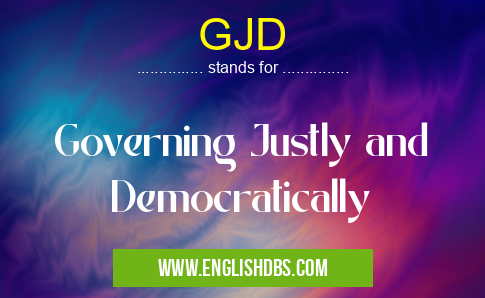What does GJD mean in UNCLASSIFIED
GJD stands for Governing Justly and Democratically. It is a framework for assessing the quality of governance in a society. The GJD framework is based on the principles of justice, democracy, and human rights.

GJD meaning in Unclassified in Miscellaneous
GJD mostly used in an acronym Unclassified in Category Miscellaneous that means Governing Justly and Democratically
Shorthand: GJD,
Full Form: Governing Justly and Democratically
For more information of "Governing Justly and Democratically", see the section below.
Key Components of GJD
- Justice: GJD emphasizes the importance of fair and impartial treatment of all citizens, regardless of their race, gender, religion, or other characteristics. This includes access to justice, equal protection under the law, and freedom from arbitrary detention or punishment.
- Democracy: GJD promotes the principles of democratic governance, such as free and fair elections, representative government, and accountability of public officials. It also includes respect for the rights of minorities and the participation of citizens in decision-making.
- Human Rights: GJD recognizes the fundamental rights of all individuals, as enshrined in international human rights law. This includes the right to life, liberty, and security of person; freedom of expression, association, and assembly; and the right to a fair trial.
Significance of GJD
GJD is a valuable tool for assessing the governance practices of a society. By promoting justice, democracy, and human rights, it helps to ensure that governments are accountable to their citizens and that the rights of all individuals are protected.
Essential Questions and Answers on Governing Justly and Democratically in "MISCELLANEOUS»UNFILED"
What is Governing Justly and Democratically (GJD)?
GJD is a concept that emphasizes the importance of governance that is based on principles of justice, fairness, and democratic participation. It recognizes the need for governments to be accountable to their citizens and to respect human rights and the rule of law.
Why is GJD important?
GJD is crucial because it promotes:
- Social justice: Equal opportunity, fair treatment, and protection of vulnerable populations.
- Political participation: Involvement of citizens in decision-making and accountability of leaders.
- Rule of law: Respect for laws and human rights, ensuring fairness and predictability.
- Economic development: Sustainable growth, equitable distribution of resources, and protection of the environment.
How can GJD be achieved?
Achieving GJD requires:
- Strong institutions: Independent judiciary, legislature, and executive branch that operate transparently and effectively.
- Empowering citizens: Education, freedom of expression, and mechanisms for participation, such as elections and civil society organizations.
- Accountability systems: Independent oversight bodies, whistleblower protections, and mechanisms for holding leaders accountable.
- Inclusivity and diversity: Representation of different perspectives, identities, and interests in decision-making processes.
What are the benefits of GJD?
GJD brings numerous benefits, including:
- Increased trust in government: Citizens feel more confident in leaders and institutions.
- Reduced corruption: Transparency and accountability discourage illicit activities.
- Social cohesion: Inclusive participation fosters unity and reduces social divisions.
- Improved economic outcomes: Stability, rule of law, and citizen participation promote investment and growth.
- Enhanced international cooperation: GJD strengthens partnerships and promotes global norms.
What are the challenges to GJD?
GJD faces several challenges, such as:
- Authoritarianism: Governments that suppress dissent and limit citizen participation.
- Corruption: Abuse of power and personal enrichment undermine trust and accountability.
- Inequality: Socioeconomic disparities can hinder inclusive participation and access to justice.
- Lack of education: Limited civic knowledge and skills can reduce citizens' ability to engage in GJD.
- Technology: Social media and digital divides can influence public opinion and create barriers to participation.
Final Words: GJD is an important framework for promoting good governance and protecting the rights of citizens. By adhering to the principles of justice, democracy, and human rights, governments can create a more equitable and just society for all.
